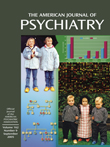To the Editor: The article by Karen A. Graham, M.D., et al.
(1) provided a stimulating account of a difficult clinical area, and we congratulate the authors on a careful study with important implications. However, we have one concern that may dilute some of the findings or at least suggest a future research direction. This relates to the lack of information on the nutritional composition of the diets and the caloric intake of the research subjects.
Of course, the authors noted earlier work
(2) that proposed an important role for reduced physical activity and increased caloric intake in weight gain in a similar (and similarly small) group. They rightly pointed out that measuring food intake is “challenging” and accepted that accurate self-reporting of food intake is difficult for a psychotic person, especially when away from inpatient scrutiny. But we suggest that basic data on nutritional composition can be obtained more readily and may indicate a possible line of management.
Our work in progress, in the inpatient setting of a psychiatric intensive care unit (a locked unit with a higher staff-to-patient ratio for disturbed or violent patients who cannot be managed safely on an open psychiatric ward), supports the findings of Dr. Graham et al. of increased body fat and triglyceride levels in psychotic men who were exposed to antipsychotic drugs (not only olanzapine).
In our patients, we estimated their “correct” daily calorie requirement to be around 1800 calories/day, but their observed intake was in excess of 2100 calories/day. Hospital diets carry a high glycemic index, reflecting eating preferences outside the hospital. Pereira et al.
(3) have shown that reduction in glycemic load (a diet with a low glycemic index) reduces levels of circulating insulin, triglycerides, and C-reactive protein and may prevent or treat obesity and some of its health consequences.
We would also be interested to know if Dr. Graham et al. found a correlation between psychotic stress (reflected in Brief Psychiatric Rating Scale scores) and insulin and nonfasting glucose levels, as suggested by Shiloah et al.
(4) and replicated by ourselves
(5).
We have speculated elsewhere
(6) that diet could be recommended as a medical intervention, and our experience has been that people feel enabled by nutritional advice that is underpinned by accessible explanations for that advice
(7).
As far as a link between olanzapine and weight gain is concerned, we note that the range of reported weight gain in the acute-phase clinical trials posted by the manufacturer (http://www.lillytrials.com/results/by_product/results_ zyprexa. html) is from about 3% to about 17%, compared with about 2% for placebo. In longer-term studies, 54% of the patients taking olanzapine gained weight, compared with 28% of the patients taking haloperidol (Eli Lilly trial 980). Weight increased with olanzapine treatment in a dose-dependent manner in at least one study (Eli Lilly trial 982, p. 15).
These and other studies are arguably flawed in they did not take in other factors, such as diet, family history, ethnicity, use of cannabis
(8) and other substances, properly into account, but the tantalizing clues pointing to a causal link between olanzapine and weight gain await larger-scale studies.

